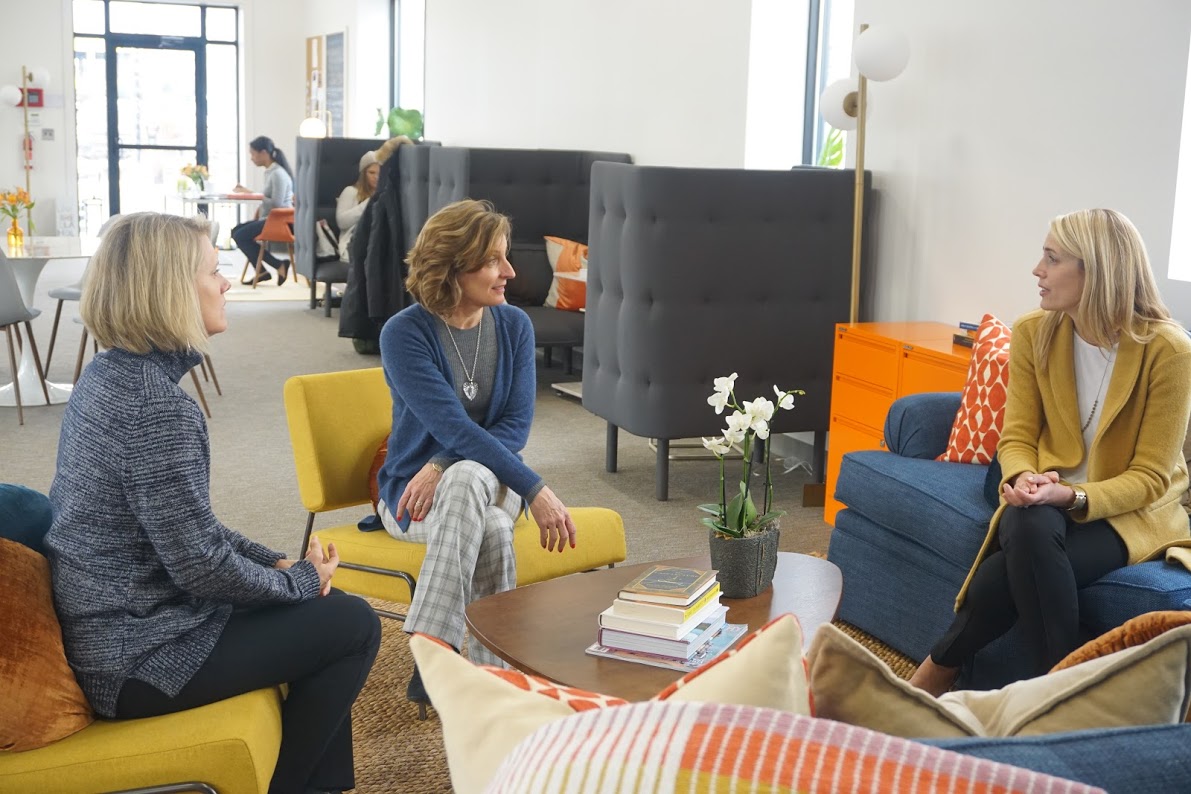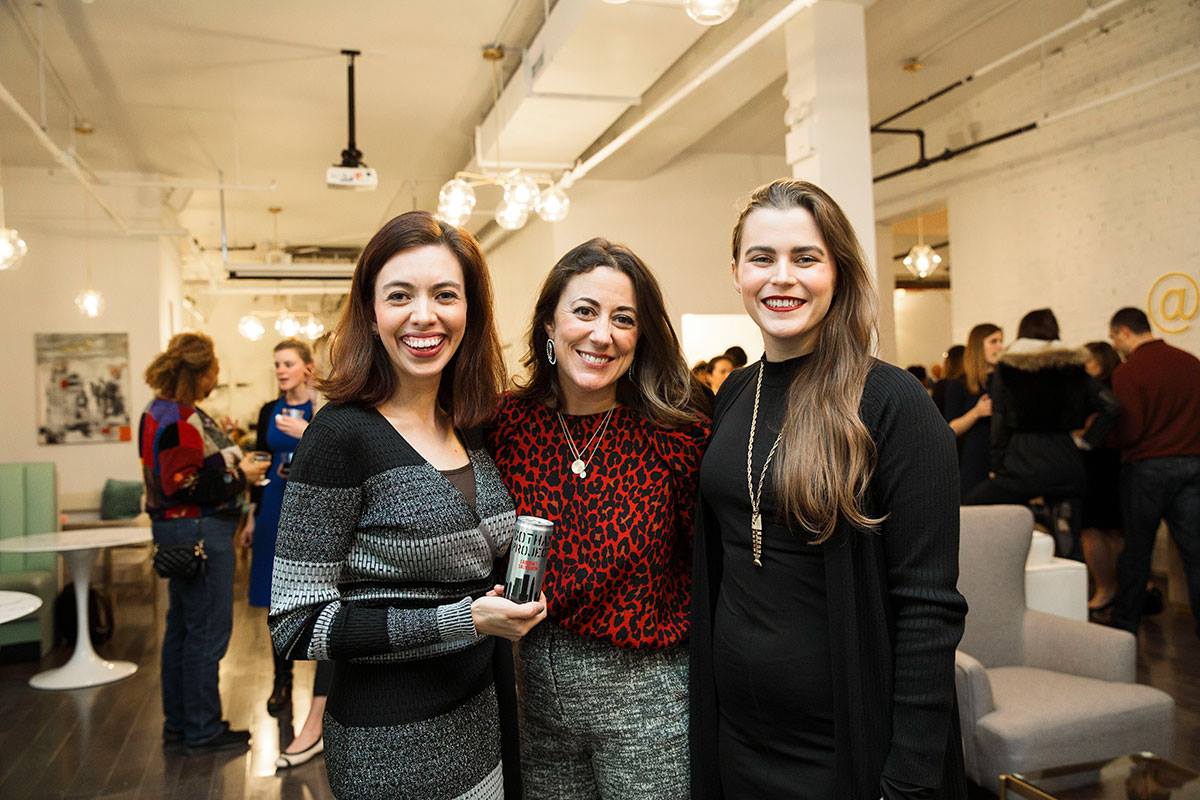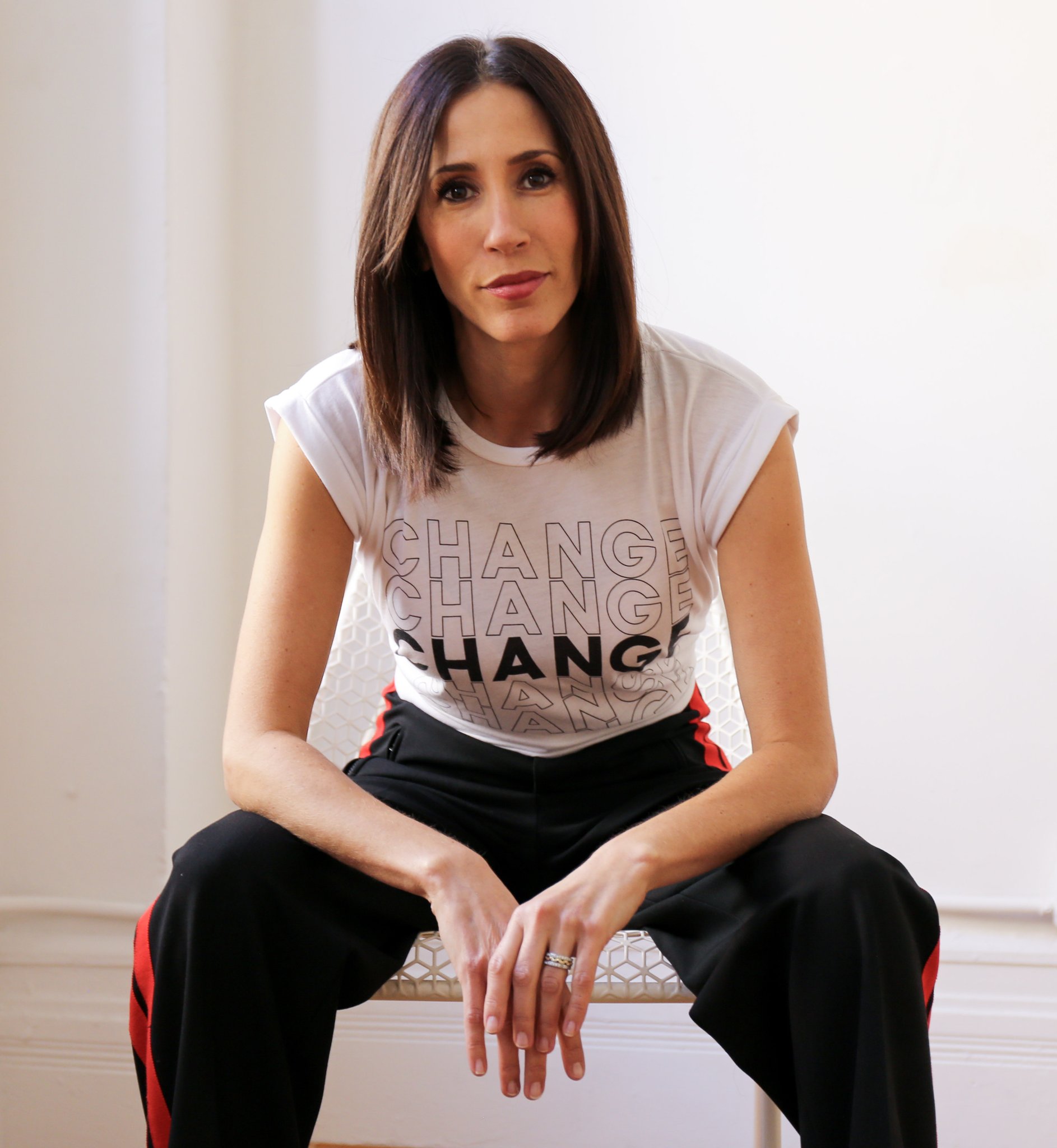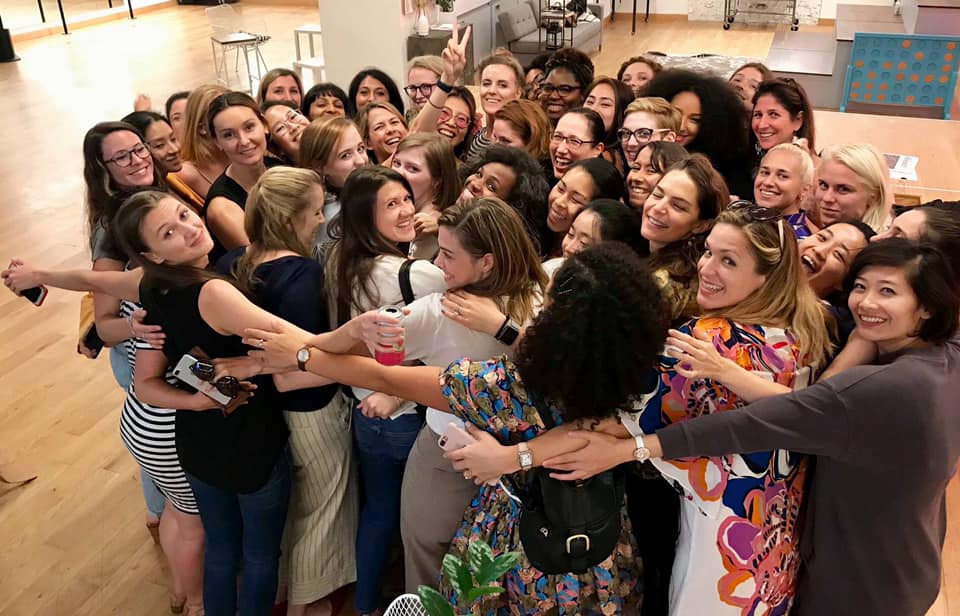In the age of questioning how we do just about everything from ordering groceries to streaming music, women are finally pushing back on traditional standards of business networking and, as a result, are launching their own virtual circles that serve, lift and empower them. Networking as we know it is dead. And like so many other industries that we accepted as infallible, networking is ripe for disruption.
Imagine yourself standing in a hotel ballroom filled with men and women in homogenous suits, logo lanyards dangling from their necks, clipped with a pre-printed name tag tucked neatly inside a stiff plastic sleeve, polyester-skirted tables lining the perimeter of the room with eager corporate representatives anxious to draw you in, and a brick of business cards burning a hole in your purse as you attempt to spark conversation with a sea of nervously smiling professionals.
Like many women, I get hives just thinking about networking events like this.
The old and tired model of filling a room with industry-specific professionals and letting them loose like bulls in a ring does only one thing: It rewards outgoing, confident and assertive professionals, but ultimately stifles most.
It also creates a huge barrier for women because, as we have come to discover, this is not how women naturally network.
Historically, women have shared much more of their lives with each other than they do in today’s environment of fragmented extended families, digital media, and remote work arrangements. They shared child-rearing responsibilities (“it takes a village”), they hunted and gathered together, wove together, quilted together, created meals together, prayed together and were each others’s pillars of strength when navigating the day-to-day challenges of their lives.
When looking broadly across all cultures of the world, history shows that women who connect and network through communities and “tribes” significantly benefit from sharing with other like-minded and inter-connected women.
In fact, in a recent study on networking circles and leadership, researchers concluded that landing high-level leadership positions was directly correlated to being connected to other well-connected peers in one’s social networks. More importantly, the researchers found that successful female leaders shared an additional characteristic: they all had an intimate tribe or tight-knit community of other like-minded, successful and/or well-connected women.
Ask any woman who is part of a formal, informal, in-person, or online community how it has influenced her life, and you will hear stories ranging from receiving much-needed emotional support to landing much-needed venture funding.
Sierra Busch found online communities — all of which are primarily executed through common platforms like Slack, Google Groups, and private Facebook groups — to be a significant help as she launched her immersive travel venture Creative Edge Travel. “Being part of women-driven communities allowed me to observe other entrepreneurs’ fears, worries, and triumphs, which helped me build the right mindset before I started my own business. It’s wild to think about, but online communities have been the primary source of my success thus far.”
The power of virtual tribes
In 2015, Gesche Haas sought to assemble a group of ambitious, interesting women to work around a table from time-to-time, discuss relevant business challenges and help support one another’s professional growth. What started as an intimate tribe that she personally needed for her own development, organically grew five years later into Dreamers and Doers, one of the most admired and sought-after communities for trailblazing women who actively engage in her private Facebook groups and in-person events.

Bilyana Freye, founder of the job-shadowing platform Hoppin, shared that through Dreamers and Doers, she felt embraced by a tribe of new friends and business collaborators overnight. “Aside from the invaluable close friendships, I’ve attended exclusive V.C. events, received invaluable press, and won many new brand ambassadors for Hoppin — all through this community.”
Nicole Robertson, founder of Swap Society, added that “being a startup founder can feel very isolating, and this community has provided me with an amazing tribe of women that support each other in the most meaningful ways.”
Melanie Curtis, professional skydiver, public speaker, author, and life coach, joined the Ellevate Network, a community of professional women committed to helping each other succeed, for its culture of inclusion, positivity, education, championing others, and building win-wins. Melanie added, “Simply knowing I have this massive freaking group of fierce like-spirited women in my corner has been huge for me.”
Heymama, another popular and quickly expanding community connecting entrepreneurial moms, grew out of the founders’ need for a space to share their worlds, discover new people and opportunities, and collaborate with like-minded “mamas.” Kristiana Tarnuzzer, founder of The Cause Bar, joined Heymama in hopes of simply just meeting some other people that might be fun to see for a play date or cup of coffee every once in a while. Instead, she began building deeper relationships with women who encouraged her to transform her passion project into a business. “It’s been amazing to have found this tribe of working mothers. I feel like a part of a team again, myself again, and really am not sure I would be in this place if it weren’t for these communities.”

Belma McCaffrey started the Work Bigger Community to create a safe space for women to share struggles and wins around their work and life. She explained, “Community allows you to build connections with others who share your values. You don’t feel like you’re ‘networking.’ You feel like you’re building friendships and cheering each other on during challenging times.”
Then there’s the new Female Founder Collective (FCC) which was created by Rebecca Minkoff to allow people to find and identify female-founded or majority female-run entities. Wendy Heilbut, both attorney for and member of FCC, added, “The real significance of the FFC is its ability to shift the flow of money. We all know about the gender pay gaps and the gender funding gaps. Rebecca founded the FFC because she knows women control a lot of the spending and that women want to support other women.”

My own community, The Upside, was born out of a need for a space where B2B solopreneurs and consultants could gain best practices, grow their business, collaborate on projects and support one another with knowledge and connections. Melissa Marra, Upside member and founder of E&M Events and Marketing agreed and added, “Through The Upside, I’ve connected with like-minded entrepreneurs with a range of expertise where we share resources, bounce ideas off each other and encourage each other. I am making meaningful connections and conversation and now have real opportunities.”
The Power of Co-working Tribes
From college sororities and university women’s groups to knitting circles and book clubs, women have been gathering in a tribe-like fashion since the beginning of time.
When Lauren Decker of The Co-co, a women-focused co-working and collaboration space located in Summit, NJ, hosted a pre-launch party for her charter members, she and her partners centered the evening around the concept of “Salon Suppers” that date back to the 1700s. Lauren explained, “At these formalized gatherings, women would convene around an intimate meal to discuss literature and share knowledge. My partners and I wanted to bring back the power of connection and community that the Salon Suppers of the 18th century brought to the most forward-thinking women of their time.”

Cate Luzio, a former Wall Street warrior, recently launched Luminary in New York City as a community-building, co-working and learning resource for professional women across all industries and levels. “I wanted to create a space in order to mobilize the ‘middle,’ support the pivoters and advance the entrepreneurs providing access and tools for their continued development. I like to think of Luminary as a ‘physical LinkedIn/Slack’ where professional women can truly flourish, and where companies can support their female employees’s development in a way that compliments their existing in-house efforts.”

Why every woman needs a tribe
Similar to the significance of mentorship, we are just now learning the immeasurable personal and professional impact of joining — or creating — a tribe. Additionally, we have only scratched the surface of the potential these communities have on women’s professional and personal success, and to closing the gender gap across leadership roles, venture funding and employee pay once and for all.
Perhaps one of these communities may be the right fit for you; feel free to comment below to tell readers about your favorite communities and how they have positively influenced your life.
Curated, paid communities:
Dreamers and Doers — a network for trailblazing women
The Upside — support, community and connections for B2B solopreneurs and consultants
Heymama — network and events for entrepreneurial moms
Ellevate — network and events for professional women
Work Bigger — scaled coaching and finding work you love
Startup Fashion — tools and resources for emerging fashion designers
The Cru — curated accountability groups of high-achieving women
Open, free communities:
Ladies Get Paid — in-person events and Slack groups for career support
Pallas Network — all things women, feminism and career
Freelancing Females — a huge community of freelancing women spanning all career levels
Female Founder Collective — network of women-owned businesses
Women-focused co-working spaces and communities:
Luminary — New York City
The Wing — national
The Riveter — national
Hera Hub — national
The Co-co — Summit, NJ
The Hivery — San Francisco
Rise — St. Louis and Denver


